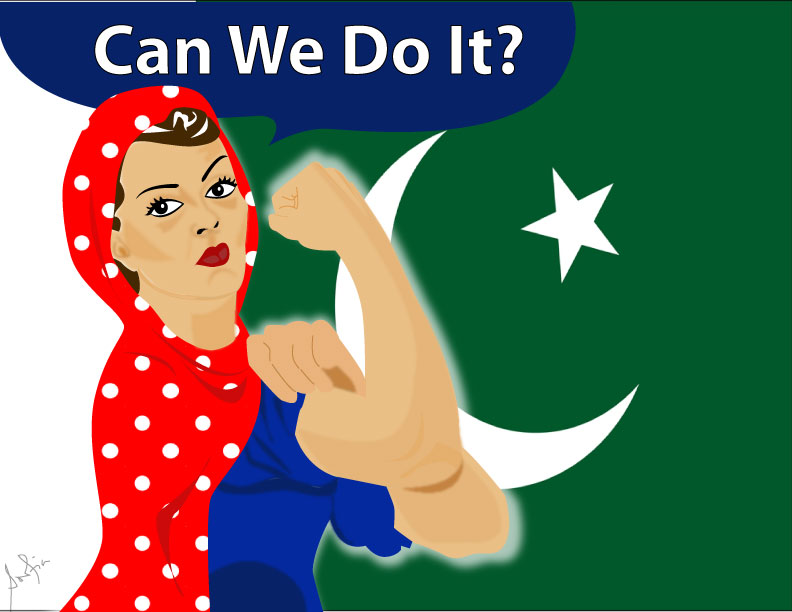My wish for Pakistan’s women
 When we look for achievements to rejoice, the lack of them leads us to our failures. But the realization of our failures is also extremely important to overcome hurdles and strengthen our resolve for a better future.
When we look for achievements to rejoice, the lack of them leads us to our failures. But the realization of our failures is also extremely important to overcome hurdles and strengthen our resolve for a better future.
Every year, to mark International Women’s Day, many events are held throughout the world to celebrate women’s achievements. In Pakistan also, civil society activists and some members of the community come together to acknowledge Pakistani women’s successes in social, political and economic arenas.
This year the UN theme for International Women’s day is “Equality for women is progress for all.” In Pakistan, one of the common topics for this day includes recognizing Pakistani women’s role in democracy. Since the pre-partition era and through many military dictatorships, Pakistan boasts of an active, if not wide, representation of women activists and leaders. We were the first Muslim country to have a woman, Benazir Bhutto, as the Prime Minister. We have women activists like Asma Jehangir who are not afraid to stand up in the face of extreme suppression. We have reserved seats in the parliament for women to ensure their representation- all achievements to be proud of.
However, in reality, how many ‘real’ achievements can we really name to our credit? The Hudood Ordinance, the barbaric law that governed adultery and rape, was not repealed until 2006 in President Musharaf’s time. The Women’s Protection Bill that was supposed to protect rape victims is still not fully implemented due to conflict with religious perceptions. The only legislative progress for women in recent times has been the Sexual Harassment law that was introduced following the selfless hard work of Dr. Fouzia Saeed.
As for the reserved seats for women in the National Assembly, they are filled, non-electively, with wives, sisters and other relatives of male political candidates without consideration of their capabilities or objectives. Those women have never been equal. The Global Gender Gap Index by the World Economic Forum reports Pakistan’s standing at the 135th position, one down from the ranking in previous years due to a worsening in political empowerment. According to their report, Pakistan occupies the last spot in the Asia and Pacific region.
Socially, the rise of fundamentalism is attempting to takeover women’s choices; decisions as simple as what to wear. Although in the urban areas, the concept of women emancipation is growing, the resistance opposing this concept, all over the country is growing much faster in the light of religious beliefs and cultural norms. The government’s on-and-off talks with the Taliban demanding the implementation of the Sharia or the Islamic code of conduct threatens the very existence of women as living, breathing human beings.
Then there are statistics that haven’t been making much progress as well. The literacy rate for women remains much lower than men’s. THe majority of women in the total workforce are engaged in the agricultural sector and overall women continue to be paid lower than their male counterparts whether in a farm growing crops or in fancy offices.
“Equality for women is progress for all” is a message that needs to be disseminated beyond the gatherings, conferences and rallies. It is a lesson that needs to be drummed into the masses’ heads. It is an idea that is to be believed in Pakistan, especially by women themselves. According to a recent survey, 43 percent of women in Pakistan believe that wife beating is justified. These reasons include arguing with the husband, neglecting her children, refusing sexual intercourse, going out of the house without informing her husband, neglecting her parents-in-laws and even burning the food.
I insist that those who raise their voices for women’s rights and their equality must realize that the women they are standing up for still do not believe in those rights. We must celebrate, we must bemoan and we must challenge the system and laws for our cause. But before all of this, we need to focus on making the women of our country aware and in acceptance of the respect and position they deserve in the society as human beings, regardless of religious beliefs. We need their conviction and their voices to back our demands for equality.
This year on International Women’s Day, I wish for every Pakistani woman – urban or rural, educated or illiterate, to believe and say, “I am Equal.”
Author: Soofia Says
Editor: Manasi Gopalakrishnan



